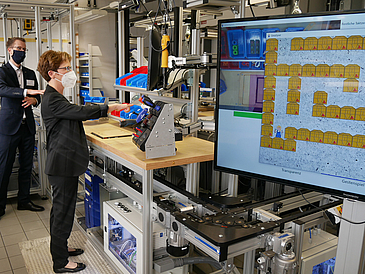Initial fears regarding dealing with artificial intelligence (AI – in German “KI”) methods are everywhere in small and medium-sized enterprises (SMEs). This is often because of a lack of experience with new technology. “In order to allow for the potential of AI to be used, its often misunderstood functionalities need to be understood and possible application contexts must be known,” states Professor Kirsten Tracht. The engineer is head of the KI_Cafe project at the Bremen institute for Mechanical Engineering at the University of Bremen, which hopes to help companies in introducing AI. There has been a lack of suitable communication and teaching concepts to transfer this knowledge to date. Additionally, company structures need to enable low threshold and constant access to the methods of AI instead of obstructing it.
Regular Workshops in Partner Companies
The solution for this problem is a communication and experience concept that is connected to companies’ day-to-day operations - KI_Cafe. It is initially being established in two partner enterprises. In the frame of the KI_Cafe, regular workshops will be held in the companies, to which staff from all company levels will have open and noncommittal access. “Staff will have the opportunity to talk to scientists from the University of Bremen and deepen their knowledge of the opportunities provided by AI,” explains project staff member Björn Papenberg.
In the KI_Cafe, an application demonstrator, which will allow for the assessment of the cutting quality of a milling tool, will be implemented. Thanks to the use of AI methods, this assistant system will support manufacturing staff in judging the wear and tear to end mills. “The joint creation of the demonstrator together will people from production will be made possible by the KI_Cafe, so that their expertise can flow directly into science,” states Kirsten Tracht. Due to the direct collaboration with the scientists and the erection of the AI demonstrator in the center of production, the AI demonstrator is being introduced in a familiar, technical scenario.
Project Also Interesting for Political Sector
The approach of the KI_Cafe has also awoken interest in the political sector. As the transfer of AI into medium-sized companies is a key competence for the coming years, Sarah Ryglewski – Parliamentary State Secretary for the Federal Minister of Finance – and Bremen’s Senator for Science and Ports, Claudia Schilling, visited bime at the start of the project. Opportunities in society and the possibilities that come from the project were discussed with the politicians and the results from other various projects were presented. The politicians also dove into the world of virtual reality and walked through a construction scenario together with a collaborative robot. In the frame of the construction process of the future, they were able to test an assistance system for manual construction scenes where a computer is controlled by various hand gestures and humans are accompanied intuitively and iteratively through the process.
About Bremen Institute for Mechanical Engineering (bime)
The Bremen Institute for Mechanical Engineering (bime) is one of the institutes of the University of Bremen. The institute was established in 2008 when the three disciplines production facilities, technical mechanics – structural mechanics and product design from the Faculty of Production Engineering came together. Bime staff carry out research in national and international projects and networks, as well as work on basis research within industrial research collaborations. The work carried out at bime focuses on the development and operation of production facilities – from basis mechanical design to mechatronic components, controlling technology, facility operations, and productions logistics.
Further Information:
https://www.bime.de/index.php/en/
www.uni-bremen.de/en/
Contact:
Prof. Dr.-Ing. Kirsten Tracht
Bremen Institute for Mechanical Engineering
University of Bremen
Phone: +49 421 218 64840
Email: trachtprotect me ?!bimeprotect me ?!.de
Björn Papenberg
Bremen Institute for Mechanical Engineering
University of Bremen
Phone: +49 421 218 64834
Email: papenbergprotect me ?!bimeprotect me ?!.de

